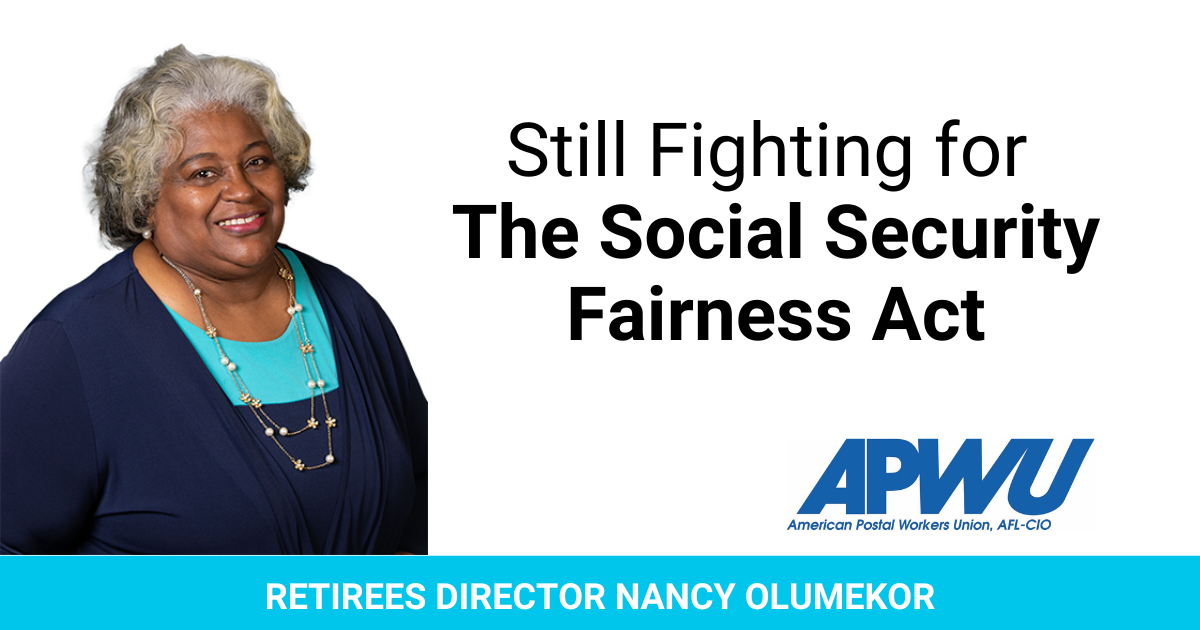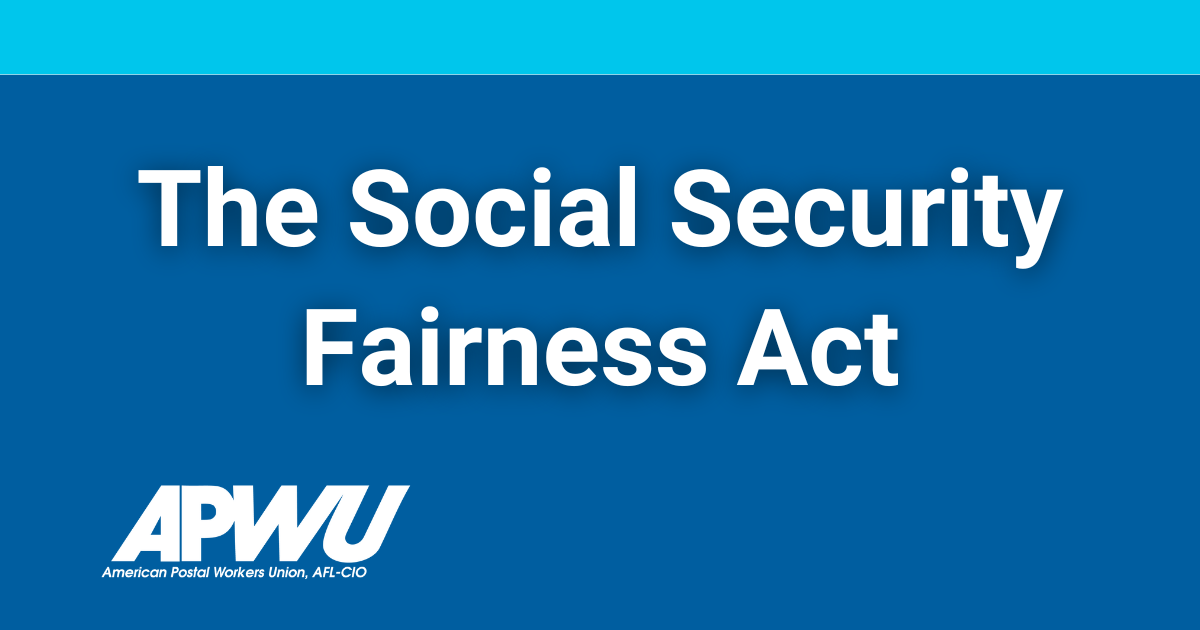CWA Statement Regarding Passage of the Social Security Fairness Act offers a comprehensive analysis of the legislation’s impact on its members and the broader labor movement. The Communication Workers of America (CWA) has taken a definitive stance on this crucial piece of legislation, advocating for specific policy changes and outlining potential consequences for its members’ retirement security. This statement details the CWA’s lobbying efforts, alliances, and public engagement strategies employed to shape the legislation’s outcome.
This detailed examination delves into the projected financial implications for various demographic groups within the CWA membership, providing illustrative examples and comparisons to the positions of other major labor unions. The analysis also considers the broader implications for working-class Americans and the future of Social Security reform, offering a nuanced perspective on this critical issue.
The CWA’s statement on the Social Security Fairness Act’s passage is significant for retirees. It’s a welcome development, offering much-needed relief. For a completely different kind of momentum, check out this incredible play: Highlight: Derrick Henry Front Flips Into Red Zone on 13-Yard Run. Returning to the CWA statement, the impact on vulnerable populations is particularly noteworthy.
CWA’s Stance on the Social Security Fairness Act
The passage of the Social Security Fairness Act has significant implications for the Communications Workers of America (CWA) and its members. This article details the CWA’s official position, the expected impact on its members, the union’s advocacy efforts, and the broader context of this legislation within the labor movement.
CWA’s Official Position on the Social Security Fairness Act
The CWA strongly supported the Social Security Fairness Act. Their official statement emphasized the unfairness of the current system, which penalizes individuals who worked for public sector jobs or non-profit organizations by reducing their Social Security benefits due to delayed or inconsistent payments. The CWA argued that this disparity disproportionately affects women and workers of color. The union advocated for the elimination of the Windfall Elimination Provision (WEP) and the Government Pension Offset (GPO), key provisions within the Act, believing these provisions unjustly reduce retirement benefits for many dedicated workers.
Impact on CWA Members’ Retirement Benefits, CWA Statement Regarding Passage of the Social Security Fairness

The passage of the Social Security Fairness Act is expected to significantly benefit CWA members, particularly those who worked in public service or non-profit sectors. The elimination of WEP and GPO would result in increased Social Security benefits for these individuals. For example, a CWA member who worked for a state government for 20 years and also had a private sector job might see a substantial increase in their monthly retirement check.
Similarly, a CWA member who worked primarily in a non-profit organization could also see a substantial boost to their retirement income.
The CWA’s statement celebrating the passage of the Social Security Fairness Act highlights a significant victory for workers. It’s a stark contrast to the sadness felt today with the news of the passing of a true baseball legend; Rickey Henderson, legendary leadoff hitter, passes away at 65. The CWA’s commitment to securing social security benefits underscores the importance of advocating for policies that protect working people throughout their lives.
The projected impact varies across different demographic groups within the CWA membership. Women, who are often employed in lower-paying jobs and public service, stand to benefit the most. However, all CWA members who were affected by WEP and GPO will experience a positive change in their retirement benefits.
CWA’s Advocacy Efforts Regarding the Social Security Fairness Act
The CWA engaged in extensive lobbying efforts to secure the passage of the Social Security Fairness Act. This involved direct communication with lawmakers, grassroots mobilization of members, and collaboration with allied organizations. The union utilized various communication strategies, including targeted email campaigns, social media outreach, and press releases to raise awareness about the issue.
The CWA formed strategic alliances with other labor unions and advocacy groups sharing similar concerns about Social Security reform. These partnerships amplified the message and increased the overall impact of lobbying efforts. Member engagement was crucial; the CWA encouraged members to contact their representatives and actively participate in advocacy campaigns.
Broader Context and Implications of the Social Security Fairness Act

The Social Security Fairness Act’s passage has significant implications for the broader labor movement and working-class Americans. It represents a victory for workers who have been unfairly penalized by existing Social Security provisions. The CWA’s stance aligns with that of many other major labor unions who also advocate for a more equitable Social Security system. The act’s passage sets a positive precedent for future Social Security reform efforts, potentially paving the way for broader adjustments to ensure a more secure retirement for all Americans.
Comparison of CWA’s Stance with Other Unions
| Union Name | Support/Opposition | Key Arguments | Projected Member Impact |
|---|---|---|---|
| Communications Workers of America (CWA) | Support | Eliminate WEP and GPO; ensure fair benefits for all workers. | Increased benefits for members affected by WEP and GPO. |
| American Federation of Teachers (AFT) | Support | Fair treatment for public sector workers; strengthen retirement security. | Positive impact on members working in public education. |
| National Education Association (NEA) | Support | Address inequities in Social Security benefits; improve retirement for educators. | Significant benefit increases for members affected by WEP and GPO. |
| Service Employees International Union (SEIU) | Support | Fairness for low-wage and public service workers; enhance retirement security. | Positive impact on members working in public and private service sectors. |
Illustrative Example: Impact on a Hypothetical CWA Member

Consider a hypothetical CWA member, Maria, aged 62, with 30 years of service, 15 years in public service and 15 years in the private sector. Under the old system, due to WEP, Maria’s monthly benefit was $1200. After the passage of the Social Security Fairness Act, eliminating the WEP, her monthly benefit increases to $1500, a $300 increase. This represents a 25% increase in her monthly retirement income, significantly improving her financial security.
Visual Representation: Impact on Benefit Levels
A line graph could illustrate the projected changes in Social Security benefit levels for CWA members. The x-axis would represent different member demographics (e.g., years of public service, age at retirement), while the y-axis would represent the monthly benefit amount. The graph would show two lines: one representing benefits before the act and another representing benefits after. The graph would clearly demonstrate the significant increase in benefits for members affected by WEP and GPO, showcasing a positive upward trend across various demographic groups.
In conclusion, the CWA’s statement on the Social Security Fairness Act provides a clear and comprehensive overview of the legislation’s potential impact. By outlining both the positive and negative aspects for its members and the broader labor movement, the CWA demonstrates its commitment to advocating for its members’ interests and actively shaping the future of Social Security. The detailed analysis, including illustrative examples and comparisons with other unions, provides valuable insight into the complex implications of this significant piece of legislation and underscores the ongoing importance of robust advocacy for workers’ rights and retirement security.
Common Queries: CWA Statement Regarding Passage Of The Social Security Fairness
What specific benefits changes does the CWA anticipate for its members under the Social Security Fairness Act?
The CWA’s statement will detail specific changes, potentially including adjustments to benefit calculations based on factors like age and years of service. The exact nature and magnitude of these changes will depend on individual member circumstances.
How does the CWA’s stance compare to that of AARP or other senior advocacy groups?
The provided analysis will compare the CWA’s position with those of other major stakeholders, including AARP and other relevant organizations. This comparison will highlight areas of agreement and disagreement regarding the act’s impact and desired outcomes.
What future advocacy efforts does the CWA plan to undertake regarding Social Security reform?
The CWA’s statement will likely Artikel its plans for continued engagement on Social Security reform, including potential lobbying efforts, public awareness campaigns, and collaborations with other organizations.